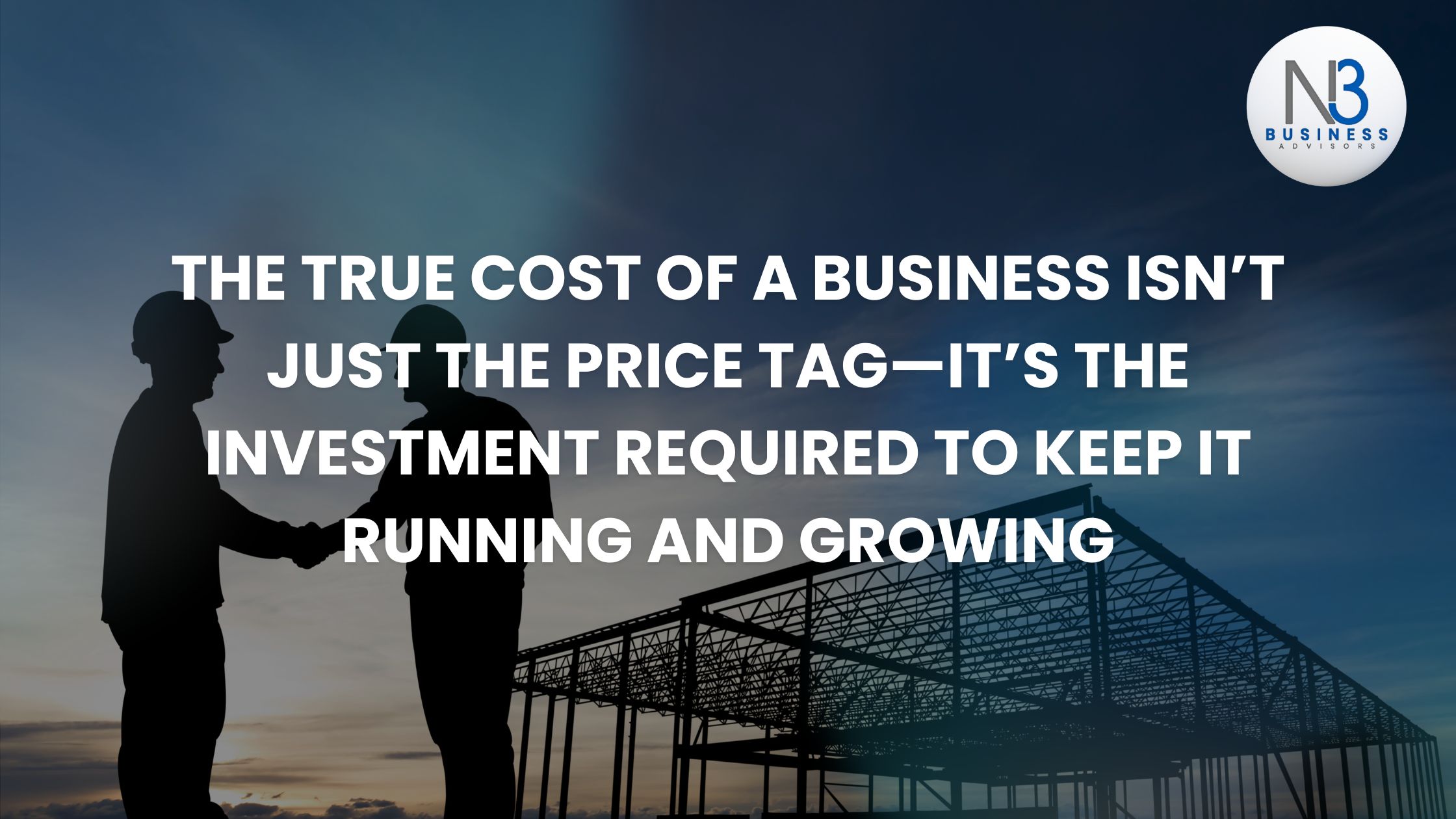Purchasing a construction company is a significant decision, and the questions buyers ask reveal what matters most to them. With over 13 years of experience helping construction businesses across Canada, I’ve found that certain questions consistently arise during the sale process. These questions are critical for both buyers and sellers to understand, as they often determine the success of a deal.
Recently, we sent out an email offering to share the “Top 5 Questions Buyers Ask When Buying a Construction Company.” The overwhelming response highlighted just how valuable this information is. In this blog, we’ll explore these top five questions, along with a few bonus questions that can sometimes make or break a deal. Whether you’re considering selling your business or simply curious about the process, these insights will help you understand what buyers truly care about.
1. What’s The Future Potential Of The Business? (It Doesn’t Matter, Even If It’s Been Profitable Now)
When evaluating a construction company, buyers are less focused on past performance and more interested in its future potential. While historical profitability is important, what truly matters is the company’s ability to grow and thrive after the sale. For instance, a buyer considering a road construction company would want to know if there are upcoming infrastructure projects or government contracts that could drive future growth, rather than just relying on past projects.
Why this question matters:
- Growth Potential: Buyers seek businesses with opportunities to expand, whether through new markets, additional services, or innovative operational strategies.
- Sustainability: A company may have been profitable in the past, but buyers need assurance that this success can continue in a dynamic and competitive industry.
- Adaptability: How well does the business respond to market shifts and economic changes? A forward-thinking, flexible company is far more appealing to buyers.
Understanding the company’s trajectory is crucial for buyers to assess whether it aligns with their long-term goals. It’s like saying, you can’t drive a car by looking in the rearview mirror.

2. What Is The Total Cost Of The Business (Not Just What the Seller Will Receive), Including Working Capital?
Buyers need a clear picture of the financial commitment involved in running the business. This goes beyond the purchase price and includes working capital, equipment replacement for old equipment, inventory, and other operational expenses. It’s worth noting that some sellers may include working capital as part of the sale, which can be a significant advantage for buyers. For example, a buyer looking at a concrete supply company would want to know if they need to invest in additional trucks or batching plants, or if the seller is including working capital to cover initial material costs.
Key considerations:
- Working Capital Requirements: How much cash is needed to cover day-to-day operations, such as payroll, bills, and materials? Buyers should clarify whether working capital is included in the sale or if it will require additional investment.
- Additional Investments: Will the buyer need to invest in new equipment, hire additional staff, or upgrade facilities?
- Financial Cushion: Does the business have enough capital to handle unexpected costs or economic downturns and also does the buyer have enough capital to expand the business?
By understanding the full financial picture, buyers can better evaluate whether they’re prepared to take on the business. Sellers who include working capital in the sale can make their business more attractive, as it reduces the upfront financial burden on the buyer.
3. Is The Business Financeable By A Bank? If Not, Will The Seller Provide Some Financing?
Financing is a critical component of any business transaction. Buyers often rely on loans to complete the purchase, so they need to know whether the business qualifies for traditional bank financing or if the seller is willing to offer financial assistance. It’s often said that a business is sold twice: once to the buyer and once to the buyer’s bank. This means the business must not only appeal to the buyer but also meet the bank’s criteria for financing. A buyer who might be interested in a commercial construction company would want to know if the business’s steady cash flow and strong client contracts make it eligible for a bank loan, or if the seller is open to financing part of the deal.
Key considerations:
- Bank Financing: Buyers will assess the business’s financial health, including cash flow, track record, and debt levels, to determine if a bank will approve a loan. Lenders will scrutinize the business’s profitability, stability, and growth potential to ensure it’s a viable investment.
- Seller Financing: If traditional financing isn’t an option, buyers may ask if the seller is willing to provide financing. This can be a win-win for both parties, as it demonstrates the seller’s confidence in the business’s future. However, it requires trust, clear terms, and a strong relationship between the buyer and seller.
- Terms and Conditions: If seller financing is offered, buyers need to understand the interest rates, repayment schedule, and other details. Clarity on these terms is essential to avoid misunderstandings and ensure a smooth transition.
This question can significantly influence the buyer’s decision, as financing options directly impact the feasibility of the purchase. A business that is financeable by a bank or supported by seller financing is far more attractive and accessible to buyers.

4. How Much Involvement Is Required From The New Owner? Is There a Management Team or System In Place?
Buyers want to know how hands-on they’ll need to be after acquiring the business. Some buyers prefer a company that runs independently, while others are prepared to take on a more active role. The presence of a strong management team or operational systems can be a major selling point. For example, a buyer looking to buy an electrical contracting company would like to know if there is a Master Electrician in place who can take over some senior management responsibilities or does the buyer need to be a Master Electrician himself/herself.
Why this question matters:
- Management Team: Does the company have a capable team that can run the business without heavy reliance on the owner?
- Owner Involvement: How dependent is the business on the current owner? If the owner is deeply involved in daily operations, the buyer may need to step into that role.
- Established Systems: Are there standardized processes, operational systems, or technology in place to ensure smooth operations?
For buyers, understanding the level of involvement required helps them determine if the business fits their lifestyle and goals.
5. Are There Any Signed Short-Long Term Contracts In Place?
Signed contracts provide stability and predictability, especially with key clients. Buyers want assurance that the business has legally binding agreements in place to maintain cash flow after the transition. For example, a buyer considering a roofing company would want to know if there are signed contracts for ongoing maintenance services or multi-year agreements with property management firms.
What buyers need to know:
- Long-Term Contracts: Are there multi-year agreements with clients or suppliers that offer predictable revenue?
- Service Agreements: Does the business have signed agreements with customers, vendors, or contractors to ensure continued operations?
- Contractual Obligations: What are the terms of these contracts? Buyers need to understand any commitments or liabilities associated with them.
A business without strong contracts can feel risky, particularly if it relies on informal or verbal agreements.
Bonus Questions
While the above questions are common, some buyers also ask additional questions that can reveal hidden risks or opportunities. These questions often play a pivotal role in the final decision.
B1. What Percentage Of Revenue Is Recurring vs. One-Time Project-Based?
Recurring revenue provides stability and makes a business more attractive to buyers. A business that relies heavily on one-time projects may face more ups and downs in its income. For instance, a buyer looking at a demolition company would want to know if the business has ongoing contracts for site clearing or if it relies solely on one-off demolition projects.
What to consider:
- Recurring Revenue: Does the business have long-term contracts, maintenance agreements, or ongoing customer relationships that ensure consistent cash flow?
- One-Time Project Revenue: How much of the income comes from large, one-off projects? While these can be profitable, they also carry higher financial risks.
B2. Are There Any Legal Lawsuits?
Legal issues can be a major red flag for buyers. Lawsuits can impact the company’s finances, operations, and reputation, so buyers need to know if any legal challenges exist. For example, a buyer considering a general contracting business would want to know if there are any pending lawsuits related to workplace safety or contract disputes.
What to consider:
- Active or Pending Lawsuits: Are there any ongoing legal battles that could affect the business’s stability or public image?
- Risk Management: How well has the company handled legal risks in the past? Are there systems in place to address potential challenges?
B3. What Percentage of Revenue Comes from the Top Five Clients?
If a significant portion of revenue is concentrated with a few clients, it can create risk. Buyers often become cautious if more than 75% of revenue comes from the top five clients. A buyer looking at a drywall installation company would want to know if the business relies heavily on a few large builders or if it has a diversified client base.
What to consider:
- Client Concentration Risk: Losing one or two major clients could severely impact the business’s financial health.
- Diversification: A more diversified customer base reduces risk and makes the business more appealing to buyers.
Final Thoughts
Whether you’re a buyer or seller, understanding these questions is essential for navigating the sale of a construction company. For buyers, these insights help assess the risks and opportunities of a potential acquisition. For sellers, addressing these questions proactively can make your business more attractive and streamline the sale process. By focusing on growth potential, financial requirements, management structure, and contractual stability, both parties can work toward a successful and mutually beneficial transaction.
Also read What Buyers Want: Preparing Your Business for a Profitable Sale
Disclaimer:
Any information provided here is for informational purposes only. It should not be considered as legal, accounting, or tax advice. Prior to making any decisions, it’s the responsibility of the reader to consult their accountant and lawyer. N3 Business Advisors and its representatives disclaim any responsibilities for actions taken by the reader without appropriate professional consultation.


